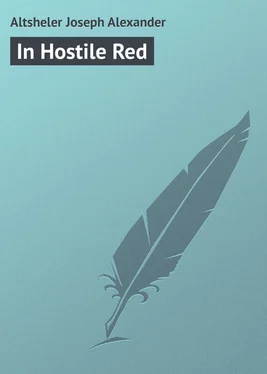Joseph Altsheler - In Hostile Red
Здесь есть возможность читать онлайн «Joseph Altsheler - In Hostile Red» — ознакомительный отрывок электронной книги совершенно бесплатно, а после прочтения отрывка купить полную версию. В некоторых случаях можно слушать аудио, скачать через торрент в формате fb2 и присутствует краткое содержание. Жанр: foreign_prose, на английском языке. Описание произведения, (предисловие) а так же отзывы посетителей доступны на портале библиотеки ЛибКат.
- Название:In Hostile Red
- Автор:
- Жанр:
- Год:неизвестен
- ISBN:нет данных
- Рейтинг книги:5 / 5. Голосов: 1
-
Избранное:Добавить в избранное
- Отзывы:
-
Ваша оценка:
- 100
- 1
- 2
- 3
- 4
- 5
In Hostile Red: краткое содержание, описание и аннотация
Предлагаем к чтению аннотацию, описание, краткое содержание или предисловие (зависит от того, что написал сам автор книги «In Hostile Red»). Если вы не нашли необходимую информацию о книге — напишите в комментариях, мы постараемся отыскать её.
In Hostile Red — читать онлайн ознакомительный отрывок
Ниже представлен текст книги, разбитый по страницам. Система сохранения места последней прочитанной страницы, позволяет с удобством читать онлайн бесплатно книгу «In Hostile Red», без необходимости каждый раз заново искать на чём Вы остановились. Поставьте закладку, и сможете в любой момент перейти на страницу, на которой закончили чтение.
Интервал:
Закладка:
"Barton may not like to be superseded thus," said Blake, "but it is the general's orders. He did not wish to take unnecessary risks."
"Anyway, we will make sure of the rebels," said Belfort, "and a bit of service like this does not come amiss, after so many weeks of feasting and dancing in Philadelphia."
"Those must be our friends on that distant hill-side yonder," broke in Marcel, "for against the green of the grass there is a blur of red, which I take to be British coats."
Marcel was right, and the two parties soon formed a junction. Barton, a middle-aged officer, did not seem so displeased as Blake thought he would be at the coming of the reinforcements and his own supersession in the command.
"What news?" asked Blake eagerly of him. "Have you seen anything of the rebels yet?"
"No," replied Barton; "but if you will ride with me to the crest of this hill, I will show you the wagon-train."
Blake beckoned to several of us to accompany him, and we ascended the hill, which was crowned with oak-trees.
"See, there they are," said Barton, pointing into the valley beyond, "and I think those wagons carry enough food to tempt the starving rebels to almost any desperate deed."
About thirty large Conestoga wagons, each drawn by four stout bullocks, were moving along slowly and in single file. From where we stood we could hear the creaking of the wagon wheels and the cracking whips of the drivers.
"You are right about the temptation," said Blake, "and if Wildfoot and his men mean to make the dash upon them according to our advices, this is the place for it. It would be a matter of great ease for them to surround the wagons in that valley. You have been careful to leave no evidence of your presence, Barton?"
"Yes; this is the nearest that we have been to the wagons," replied Barton. "If the rebels are about, they cannot suspect that the train has other guard than the soldiers you see riding with it."
"I think it would be wise to keep watch as long as we can from this summit," said Blake. "It is well wooded, and will serve to conceal us from the rebels."
"Captain," said a soldier who had ridden up hastily, "Lieutenant Vivian wishes your presence immediately."
Vivian had been left in charge for the moment of the soldiers down the hill-side; and Blake, saying to us, "Come on, gentlemen," galloped back to him. We found the entire troop drawn up as we had left them, but all were gazing towards the north. We looked that way too, and at once saw the cause of this concentrated vision. Just out of musket-range and under the boughs of a large oak-tree were three or four horsemen. Their reins hung loose, and their attitudes were negligent and easy, but all wore the uniforms of Continental soldiers. Their coats were ragged and faded, as in truth were all the uniforms in our army, but enough of the color was left to allow no room for doubt.
"By heavens, this savors much of impertinence!" said Blake. "How came they there?"
"We do not know," responded Vivian. "One of the men called my attention, and we saw them sitting there just as they are now."
I had been examining the men with great attention. The one who was nearest to us was large, dark, and apparently very powerful. His figure did not appear altogether strange to me. I was vexing my brain in an endeavor to account for the recollection, when Marcel leaned over and whispered to me, —
"Behold him, Chester. It is the lively gentleman who chased us so hotly when we fled into the arms of our friends the British."
"What is that you say?" asked Blake, who saw Marcel whispering to me.
"I was reminding Lieutenant Melville," replied Marcel, "that we had unexpectedly renewed an acquaintance. The large man who sits nearest to us is the leader of the band who chased us into the midst of your troop the other day."
"We failed to take him then," responded Blake, quickly, "but I do not think he can escape us now."
"It would be a pity to use arms on such skulkers," said Belfort. "They should be lashed into submission with whips."
A hot reply was rising to my lips, but Blake said lightly: "Then we will even delegate the task of lashing them to you, Belfort. We will look on while you ride forward and perform your duty. But wait! what does that fellow mean?"
The large man had taken notice of us apparently for the first time. With deliberate action he hoisted a piece of white cloth on the muzzle of his gun-barrel, and then began to ride slowly towards us.
"Does he mean that they surrender?" asked Blake.
"I think not," said Marcel. "That is a flag of truce. He wishes to confer with you."
"I would hold no conference with him," said Belfort. "He is a rebel and not worthy of it. Let us ride forward and shoot them down."
"Not so," said Blake; "we must recognize a certain degree of belligerency in them, rebels though they be, and we will hear what he may have to say. Let no one raise a weapon against him while he bears that white flag. The honor of England forbids it."
Belfort was silent under the rebuke, but I could see that it stung him. The American continued to approach, but when he was midway between us and his companions he stopped.
"Come," said Blake, "we will meet him." Accompanied by a party of officers – Marcel, Belfort, Vivian, and myself among the number – he rode forward. We stopped within speaking-distance of the man, who waited very composedly. Then Blake hailed him and demanded his name and his errand.
"I am Captain William Wildfoot, of the American army," said the man, "and I have somewhat to say to you that may be to your profit, if you take heed of it."
There were some murmurs in our group when the famous ranger so boldly announced himself, and Blake said, in an undertone, "It would in truth be a great mischance if the fellow escaped us now."
Then he said to Wildfoot: "We have heard of you, and I may say have been looking for you, but did not expect that you would come to meet us. What is your message?"
"I demand the surrender of your command," replied the ranger. "I would spare bloodshed, which is distasteful to me, and I pledge you my word that I will treat you well, all of you, officers and men."
At this marvellous effrontery Blake swore a deep oath, and a murmur arose from the soldiers behind us, who heard the demand, as the ranger probably intended they should.
"You may be witty, but you are not wise, Sir Rebel," returned Blake. "Yield yourself at once, and perhaps you may secure the pardon of Sir William, our commander-in-chief, though your misdeeds are many."
"Not so fast, my friend," returned Wildfoot. "What you call my misdeeds are deeds of which I am proud. At least they have been of some service to our cause and of some disservice to yours, and that, I take it, is the purpose of war. My demand for your surrender you may receive in jocular vein, but I make it again."
The man spoke with dignity, but it made no impression upon the English officers, some of whom angrily exclaimed, "Ride the insolent rebel down!" But Blake again restrained them, calling their attention to the flag of truce.
"Rejoin your companions," he said to Wildfoot "To that much grace you are entitled, but no more, since you choose to boast of your treason and other misdeeds."
"It shall be as you wish," rejoined Wildfoot, "but I will find means to let Sir William Howe know that I gave you fair warning. He cannot say that I took advantage of you."
He turned his horse and rode placidly back to his companions, while Blake sat all a-tremble with rage. The moment Wildfoot reached his comrades, who had been waiting for him in apparent listlessness, he pulled off his wide-brimmed hat, which had shaded his face during the interview, waved it to us, and galloped away through the forest, while we, with a wild shout, galloped after him.
Читать дальшеИнтервал:
Закладка:
Похожие книги на «In Hostile Red»
Представляем Вашему вниманию похожие книги на «In Hostile Red» списком для выбора. Мы отобрали схожую по названию и смыслу литературу в надежде предоставить читателям больше вариантов отыскать новые, интересные, ещё непрочитанные произведения.
Обсуждение, отзывы о книге «In Hostile Red» и просто собственные мнения читателей. Оставьте ваши комментарии, напишите, что Вы думаете о произведении, его смысле или главных героях. Укажите что конкретно понравилось, а что нет, и почему Вы так считаете.












